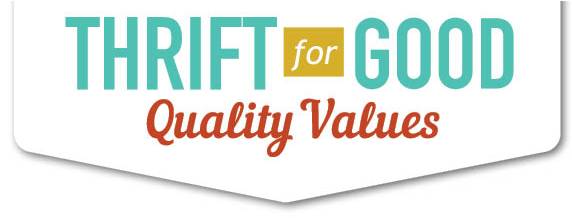We opened Thrift for Good® in October of 2020, with the idea that we could make a significant impact on a very important but very broken industry: used goods.
Thrift for Good® is a used goods market disruption company – a for-profit thrift store. Thrift for Good® is the only thrift store in the country that allows donors to choose the charity that benefits from their donation. 25% of sold proceeds go to the charity of the donor’s choice. We have generated over $200,000 for charity since opening in October of 2020, and we have over 400 charities on our list. Our model allows local charities to benefit from the sale of used goods without operating their own thrift store. The public response has been overwhelmingly positive; we now limit donations to 4 days per week.
But our concept goes beyond our donation model. We are designing an ecosystem to solve the problems in the used goods market. Our process begins with tight quality control and documentation. So far, our quality control experts have documented over 250,000 unique items, each associated with the charity of the donor’s choice. Higher end items are identified and sold online or in specialty markets. Things that are not trash but do not have monetary value are given to our affiliated charity for sorting and donation to other charities. Our zero-waste process is designed to identify the highest and best use for each item. And, unlike most other thrift stores, our process does not involve “dumping” into foreign markets.
We intend to revolutionize the used goods market by creating supply chains where none have existed before. 10,000sqft of our 14,000sqft Hurst facility is dedicated to processing donations. This space allows us to create marketable volumes of like items - almost 1,000 different categories! No one else is doing this, and that is why thrift stores are typically so disorganized and have such unpredictable variation in merchandise volume and quality. We supply tailored merchandise sets to our stores and others on a just-in-time basis. We anticipate that our facility in Hurst will be able to process enough product to supply three large thrift stores and five specialty shops. Our second store opened in Denton November 2022.
Our model will create stores in places where they’re most needed, and not just in places where donors live. Our model will also create (and stabilize) specialty stores like plus size, vintage, or high-end boutiques. Owners of these stores say they spend up to 30 hours each week sourcing goods to sell. Instead, they can buy from us at conventional retail margins. We also look forward to reciprocity of demand between different donation collection locations – what is rare in one community may be plentiful in another.
All of these unique processes are supported by the software we are developing. Existing inventory, e-commerce and point-of-sale systems are not made for used goods. Right now, the used goods industry mostly functions the old-fashioned way - on pen and paper, and without any meaningful data on turnover or profitability. We began by creating a way to get many unique items into our system quickly. Then we added custom inventory fulfillment, automated pricing, and systems facilitating turnover. Next, we're working on efficiently getting all of those products into an online marketplace so that they can be more readily accessible by our customers. We believe these systems are relevant to most unique-item businesses, and will have applicability for estate sales, art galleries, vintage stores, record stores, etc. We are pursuing patents on these systems.
We hope that this ecosystem we are creating will have industry-wide impact. In 2024, we expect to open a third location in Cleburne as well as an upscale upcycling cooperative marketplace in Hurst. From there, we will open additional donation processing facilities and stores in a hub-and-spoke pattern centered around each of Texas’s metropolitan centers. We prevent landfill, reduce the demand for sweatshop labor, provide affordable goods to people without adequate shopping options, and support small businesses with systems and wholesale merchandise, all while generating funds for the causes our donors believe in.



